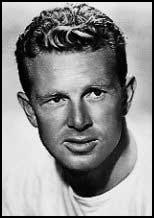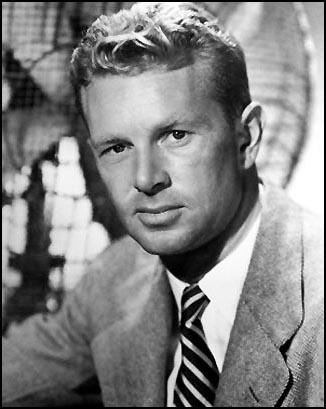Sterling Hayden

Sterling Hayden was born in Upper Montclair, New Jersey, on 26th March, 1916. After the death of his father his mother remarried and the family moved to Maine where he attended Wassookeag School in Dexter. He dropped out of high school at the age of 16 and took a job as mate on a schooner.
Hayden later skippered a trading schooner in the Caribbean after earning his master's license, and in 1937 he served as mate on a world cruise of the schooner Yankee. The following year he was awarded his first command, skippering the square rigger Florence C. Robinson 7,700 miles from Gloucester, Massachusetts, to Tahiti in 1938.
Hayden, who was 6' 5" (1.96 m) tall was offered work as a model. This led him to be signed by Paramount Pictures. His first film was Virginia (1941). During the making of the film he fell in love with the established English actress, Madeleine Carroll. The couple got married and appeared together in Bahama Passage (1942). Paramount promoted him as the "The Most Beautiful Man in the Movies!"
Madeleine's sister was killed in the Blitz, and she decided to give up acting to work in field hospitals as a Red Cross nurse in Europe. Hayden also wanted to take part in the Second World War and using the pseudonym "John Hamilton" joined the Marines as a private. His abilities were soon recognised and he was recommended for Officer Candidate School. After graduation, he was commissioned a second lieutenant and was transferred to service as an undercover agent under William J. Donovan.
In 1944, as a member of the Office of Strategic Services (OSS) he was involved in supplying partisans in Italy and Yugoslavia. This included those led by Josip Tito. He was awarded the Silver Star for gallantry. The citation claimed he had "displayed great courage in making hazardous sea voyages in enemy-infested waters and reconnaissance through enemy-held areas". Hayden was also parachuted into Croatia and promoted to the rank of captain on 14th February, 1945. Hayden later admitted that during the war he had been "enraptured by the Partisans of Yugoslavia" and had "became exposed to Communist ideology".
Hayden joined the American Communist Party in June, 1946 and became active in left-wing organisations in Hollywood. He left the party after a few months: "What did I care for labor? For racial discrimination? For civil liberties and the war between the classes? Oh, I cared in my own fashion. I cared just enough to embrace these things as props, flailing away night after night at semi-drunken parties.... I'd rather be wrong on my own than be right on somebody else's say-so."
Hayden resumed work as a film actor and appeared in Blaze of Noon(1947), El Paso (1949) and Manhandled (1949). He later recalled: "There's nothing wrong with being an actor, if that's what a man wants. But there's everything wrong with achieving an exalted status simply because one photographs well and is able to handle dialogue.... In the final analysis, an actor is only a pawn - brilliant sometimes, rare and talented, capable of bringing pleasure and even inspiration to others, but no less a pawn for that."

Hayden's breakthrough film came in 1950 when director, John Huston, asked him to appear in The Asphalt Jungle. The film received five Oscar nominations and Bosley Crowther, the film critic for The New York Times, argued: "This film, derived by Ben Maddow and John Huston from Mr. Burnett's book and directed by Mr. Huston in brilliantly naturalistic style, gives such an electrifying picture of the whole vicious circle of a crime... From the very first shot, in which the camera picks up a prowling thug, sliding along between buildings to avoid a police car in the gray and liquid dawn, there is ruthless authority in this picture, the hardness and clarity of steel, and remarkably subtle suggestion that conveys a whole involvement of distorted personality and inveterate crime."
On 8th March, 1951, the Un-American Activities Committee began an "Investigation of Communism in the Entertainment Field". Sterling Hayden appeared on 10th April. Robert Vaughn, the author of Only Victims: A Study of Show Business Blacklisting (1972) has argued that "Hayden... was the first of many who elected to put the continuance of their careers ahead of personal and professional friendships." People named by Hayden included Robert Lees, Karen Morley and Abraham Polonsky. Hayden also said: "One of them was someone named Bernie but I never knew his last name. He was a sort of intellectual type and led the educational discussions." He was talking about the young screenwriter Bernard Gordon who was later named by William Alland.
Hayden later commented in his autobiography, Wanderer (1963): "Not often does a man find himself eulogized for having behaved in a manner that he himself despises. I subscribed to a press-clipping service. They sent me two thousand clips from papers east and west, large and small, and from dozens of magazines. Most had nothing but praise for my one-shot stoolie show. Only a handful - led by The New York Times - denounced this abrogation of constitutional freedoms whereby the stoolie could gain status in a land of frightened people."
Hayden confession allowed him to continue making films. This included The Star (1952), Flaming Feather (1952), Hellgate (1952), Fighter Attack (1953), Kansas Pacific (1953), Naked Alibi (1954), Arrow In the Dust (1954), Johnny Guitar (1954), Suddenly (1954), Top Gun (1955), The Last Command (1955), The Killing (1956), Crime of Passion (1957), Valerie (1957), Gun Battle at Monterey (1957), Zero Hour (1957) and Terror in a Texas Town (1958).
On 22nd November, 1963, President John F. Kennedy was assassinated in Dallas. Hayden had severe doubts that Lee Harvey Oswald was the lone gunman and he supported Mark Lane in his attempts to reopen the case and joined the Citizens Committee of Inquiry. Lane pointed out in Plausible Denial: Was the CIA Involved in the Assassination of JFK (1991): "Having almost exhausted the available traditional resources, I turned toward an informal network that had been established years before... I formed an organization... the Citizens Committee of Inquiry. Its purpose, from the time it was founded in 1964, was to bring together people interested in securing the facts about the death of the president. It was clear that an extraordinary response was required to meet the effort of the police and spy organizations to offer a sanitized solution to the murder and to discourage serious inquiry."
Other films that Hayden appeared in included Dr. Strangelove (1964), Hard Contract (1969), Loving (1970), The Godfather (1972), The Long Goodbye (1973), The Final Programme (1973), Deadly Strangers (1974), 1900 (1976), King of the Gypsies (1978), Winter Kills (1979), The Outsider (1980), Nine to Five (1980), Gas (1981) and Venom (1981).
Sterling Hayden died of prostate cancer at his home in Sausalito on 23rd May, 1986.
Primary Sources
(1) Sterling Hayden, Wanderer (1963)
Not often does a man find himself eulogized for having behaved in a manner that he himself despises. I subscribed to a press-clipping service. They sent me two thousand clips from papers east and west, large and small, and from dozens of magazines. Most had nothing but praise for my one-shot stoolie show. Only a handful - led by The New York Times - denounced this abrogation of constitutional freedoms whereby the stoolie could gain status in a land of frightened people.
